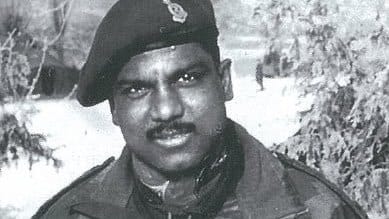New Delhi: A forgotten chapter in the Army’s history came under the spotlight this week as South Korea decided to honour an Indian officer who, along with his team, played a crucial role in the 1950-53 Korean War.
Come July 2020, Lt Col A.G. Rangaraj, India’s first paratrooper, will be celebrated across South Korea as the ‘Korean War Hero for the month’.
A decorated soldier and recipient of the Maha Vir Chakra, Rangaraj commanded the 60 Para Field Ambulance — a medical unit of the Army now known as 60 Para Field Hospital — that treated an estimated 2.2 lakh patients during the Korean war.
The decision to honour Rangaraj has been taken by the Korean Ministry of Patriots and Veterans Affairs to mark the 70th anniversary of the Korean war next year.
“During the month of July 2020, Lt Col A.G. Rangaraj’s photo will be put up in the war memorial and other public places in Korea,” said Colonel Lee In, the defence attaché at the Embassy of the Republic of Korea in New Delhi.
“This gesture is a token of appreciation from the heart of Korean people for the sacrifices made by the participating nations,” he said.
India was among 21 United Nations [UN] members, including the US, Australia, United Kingdom, Canada, Turkey, France, Italy, Denmark, Sweden, and Norway, which supported South Korea during the war, triggered by a North Korean attack.
While India did not get militarily involved in the conflict, it offered medical help for war-affected soldiers and civilians by deploying the medical unit in South Korea for the duration of the war.
Also read: To reform defence budget, Modi govt considers allotting arms purchase funds for 5 years
Decorated unit
Lt Col Rangaraj, a doctor, was India’s first paratrooper. He was an alumnus of Madras Medical College and joined the Indian Military Service in July 1941.
Rangaraj passed away on 25 March 2009.
As the commander of the 60 Para Field Ambulance, he was in charge of leading India’s medical support in the war.
However, the ‘war hero’ honour isn’t the first time Korea has recognised him. He also received unit commendation (citation) from Lee Jongchan, chief of the general staff, during the Korean war.
According to information available with his unit, it was on 23 March 1951, when Rangaraj accompanied a US army regiment for what has come to be known as Operation Tomahawk, which saw over 3,000 soldiers para-dropped deep into territory held by North Korean forces.
Led by Rangaraj, the ambulance unit operated under extreme weather conditions and attended to the casualties of the operation.
Brig (Dr) Arvind Kumar Tyagi (Retd), an oncosurgeon who served with the unit, told ThePrint that the team had refused to walk back from the territory as they “were wary of leaving their heavy equipment and medicines behind”.
“So, they were said to have found an abandoned train… which they somehow managed to operationalise with great difficulty… and eventually got back with their equipment,” he said.
The unit reportedly suffered three casualties in Korea.
Apart from Lt Col Rangaraj, another unit member, Major N.B. Banerjee, received a Maha Vir Chakra for his role during Operation Tomahawk.
Altogether, soldiers of the unit got seven Vir Chakras and 26 mentions-in-despatches, he said.
Rangaraj, Banerjee and two other officers of the unit were also conferred the Chungmu Distinguished Military Service (Meritorious) Award, which is the third-highest award of the Korean military for distinguished service.
While deployed in Korea, the soldiers got several commendations from the Korean government for displaying bravery under wartime circumstances while providing medical relief to soldiers.
After the war ended in 1953, India dispatched a Brigade Group called Custodian Forces-India (CFI) with 5,230 personnel, and the ambulance unit was merged with it. The CFI was reportedly responsible for the repatriation of 25,000 prisoners of war.
Over the years, the illustrious medical unit has also received citations from other countries, such as Australia, the US and, more recently, Nepal, for the role they played during the 2015 earthquake.
Col Lee In said this is the first instance when an Indian Army officer has been chosen as a Korean war hero as part of anniversary commemorations. “Since 60 Para Field Ambulance participated in various operations and provided medical support, there is a possibility to have more cases,” he said.
“[It is] thanks to the participation of UN forces that Korea could protect its freedom and democracy and prosper. We will never forget India’s contribution as one of the 21 countries of UN forces, and will reward with gratitude,” he added.
In 2010, former South Korean President Lee Myung-Bak had said that Korea was fortunate to have India as a friend during the war.
“The medical unit headed by Col A.G. Rangaraj valiantly rushed to the aid of wounded soldiers in the face of a fierce crossfire. For its distinguished service, the unit received citations of merit from the Korean government on a number of occasions,” he had said. “Had it not been for the devoted services and sacrifices of the Indian people, Korea would not have become what it is today.”
Also read: Army proposal to shift training command from Shimla to Meerut is awaiting govt green light







Great
This is great. Thank you for doing a story on this and for amplifying the role our armed forces have played. We’ve lost many, and many have served in international theatres. They largely remain forgotten, especially those that fought in WWI. Ambulance units, despite not being ‘active’ often are exposed to action on the front. India has a great traditional of Ambulance units.